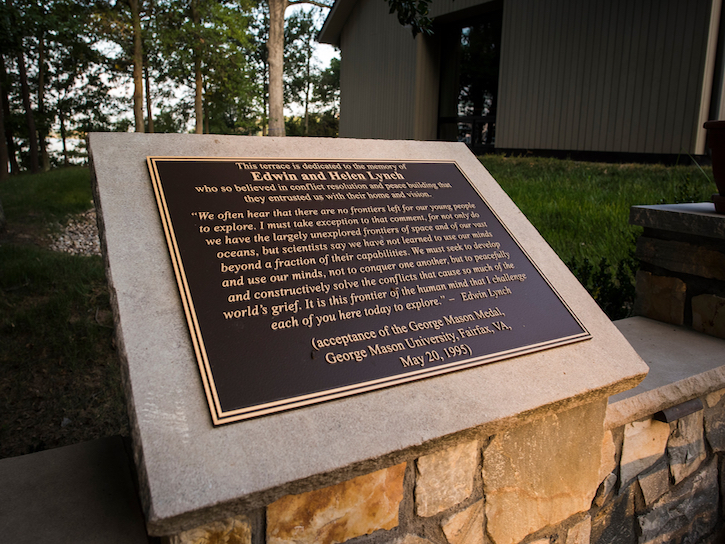
Edwin and Helen Lynch plaque at Point of View
The path that has led to a $2 million gift to George Mason’s School for Conflict Analysis and Resolution—among the largest in the school’s history—began more than 30 years ago.
Steve Cumbie and Drucie French were there at the beginning. In the 1980s the couple were part of a small group in the Washington, D.C. region interested in practices such as peace studies, conflict resolution, and human potential. Seeing the need for an institution in the area that could pursue these issues, the group sparked the creation at George Mason of what would become the Institute for Conflict Analysis and Resolution. It was the precursor to today’s School for Conflict Analysis and Resolution (S-CAR), one of the country’s leading institutions for understanding and addressing the conditions that cause violence and conflict.
“We were this little coterie of idealists, and we thought we could make a difference,” recalled French recently. “Mason was growing then, and it seemed like the right place in Northern Virginia for an effort like this.”
French, a longtime practitioner in the fields of depth psychology and cultural mythology, served as an early board member. And in one of the first significant acts of philanthropy for the institute, she and her husband established an endowed professorship for conflict resolution.
In the 1990s, as the institute grew, their focus moved to other things. Cumbie, one of the region’s leading real estate developers, built the Metropolitan Building, on Mason’s Arlington Campus. He later helped launch the Masters in Real Estate Development program at the School of Business, where he remains an advisory board member and mentors graduate students. In 2015, Gov. McAuliffe appointed him to the Board of Visitors, sparking his renewed commitment.
“I was always impressed with Mason because it was so entrepreneurial—and I am, basically, an entrepreneur,” said Cumbie, the CEO and principal of NVCommercial, NVRetail, and the Metro Realty group. In addition to his years of involvement at Mason, Cumbie has served in leadership roles in many community, business, and charitable organizations in the Washington area. He is a key player in the ongoing redevelopment of Tysons Corner, where his NVCommercial office is located.
From his perspective as a land developer, Cumbie offered another example of the value of conflict resolution: “When we faced opposition to development projects in Colorado, we used this approach. If people are upset, you have to first of all really listen to what they are saying. And over time we were always able to address their concerns by working with the stakeholders and the communities.” That approach, he said, is preferable to litigation.
The gift from Cumbie and French will support three major areas at S-CAR: establishing a graduate student fellowship, increasing funds for the existing endowed professorship, and strengthening programs at Point of View, the conference and retreat center on Mason Neck that Dean Kevin Avruch describes as “a civilian Camp David.”
“Our intent with this gift is to advance the field of conflict resolution, by strengthening S-CAR as an institution,” said Cumbie. “The number of graduates the school has produced is impressive—but we need even more people to go into this field. Point of View is a great asset, as well, which should be fully developed.”
“Mason should be very well known for this—for conflict resolution. Its time has come, and people recognize that. If we can raise the school’s profile, I think it will be wonderful for the university.”
